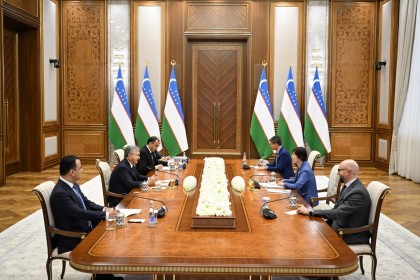The Senate at the 22nd session on December 15 passed the Uzbekistan’s 2022 State Budget Bill. The Finance Minister Timur Ishmetov said that the GDP in 2022 is projected at 839.9 trillion soums. GDP is expected to grow by 6% due to an increase in industrial production by 7%, services - by 6.5%, construction - 8.1%, agriculture - 3.3%.
Inflation is expected at 9%. The limit on attracting external debt is set at $ 4.5 billion, the maximum size of the consolidated budget deficit is 3% of GDP.
The Bill proposed some changes to the tax rates. The income tax rate is kept at 15%, and the tax rate on income in the form of dividends is kept at 5%.
The annual maximum depreciation rate and the size of the investment deduction were raised by 2 times on average.
Taxpayers are being granted the right to carry forward losses for the next 10 years following the tax period in which the loss was incurred. This scraps the requirement that the aggregate amount of the loss carried forward should not exceed 60% of the tax base of the current tax period.
The tax rate on property of legal entities is planned to be reduced from 2% to 1.5%. A requirement is being introduced that the tax base for buildings cannot be lower than the minimum value established in absolute terms per 1 sq. m at the following rates:
- in Tashkent - 2.5 million soums;
- in Nukus and provincial centers - 1.5 million soums;
- in other areas - 1 million soums.
Local deputies—Н councils get the right to apply a coefficient of 0.5 based on the development of province.
Businesses are being given the right to conduct an independent revaluation if they believe that the value of their property is below market prices. The results of the assessment will be recognized as a taxable base.
The excise tax rate for the export of natural gas, as well as for the sale of imported gas to the domestic market, is being canceled. The sale of liquefied gas by manufacturing enterprises is also exempt from excise duty.
according to provisional data the above changes, will help businesses to save 2.4 trillion soums in 2022 will remain at the disposal of taxpayers.
The Bill reduces the rates for the subsoil use tax of for oil and natural gas to 10% (now - 20% and 30%, respectively), gold and copper - to 7% (10%), tungsten - to 2.7% (10.4% ), uranium - up to 8% (10%).
The main tax rates remain unchanged: VAT - 15%, income tax - 15%, personal income tax - 12%, turnover tax - 4%.
From the next year, the tax paid on the purchase and temporary importation of a car will be canceled.
In 2022, consolidated budget revenues are projected at 254.6 trillion soums, or 30.3% of GDP.
State budget revenues are set at 200 trillion soums, or 23.8% of GDP. Of these, tax revenues - 68.5 trillion soums, including income tax - 43.7 trillion soums, turnover tax - 2.7 trillion soums, personal income tax - 22 trillion soums. The volume of indirect taxes will top 73.2 trillion soums, including VAT - 53.3 trillion soums, excise tax - 15 trillion soums, customs duties - 4.8 trillion soums. Resource and property taxes will add 25.7 trillion soums to the budget, including property tax - 3.2 trillion soums, land tax - 4.3 trillion soums, subsoil tax - 17.4 trillion soums, water tax - 9 billion soums.
The Bill defines the rules for the distribution of taxes and non-tax revenues between budget-financed units. In addition to the current procedure, it will be possible to transfer property tax and land tax from legal entities to the budgets of districts and cities in full (now these taxes are credited to regional and city budgets).
In addition to receipts from excise tax on mobile communications and alcoholic beverages, including beer, collections from excise taxes on tobacco products will be transferred to the budgets of Karakalpakstan, provinces and Tashkent city.
As a result, local budgets will receive 5.6 trillion soums of redistributed taxes.
When forming the budget, 5% of the approved expenditures of local budgets of all districts (cities) will be allocated to finance activities proposed on the basis of public opinion.
In addition, at least 30% of additional funds from local budgets will go to finance events based on public opinion. In particular, the law provides for the allocation of funds to the "Civil Initiatives Fund" in the amount of 1 trillion 553 billion soums.
The 2022 budget and the bill include proposals to improve spending efficiency, empower local governments, ensure budget sustainability, increase budget coverage, and strengthen public oversight over budget allocation.
In particular, the expenditures of more than 40 ministries and departments in 2022 will be formed on the basis of target figures. For example, when allocating funds to the Ministry of Housing and Communal Services.












